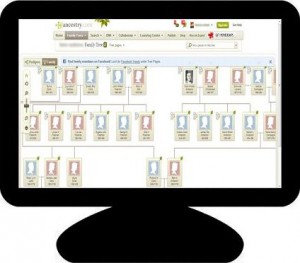 A recent reference question led me on an interesting journey discovering more about online family trees. Using a family tree service on the Web has attractive benefits: a centralized location on the Internet to store your family information, the immediacy of sharing by digital means your information with relatives and potential relatives, the thrill of locating new individuals or information to enhance your tree and further your research, not to mention networking opportunities to really thrash out a stubborn brick wall.
A recent reference question led me on an interesting journey discovering more about online family trees. Using a family tree service on the Web has attractive benefits: a centralized location on the Internet to store your family information, the immediacy of sharing by digital means your information with relatives and potential relatives, the thrill of locating new individuals or information to enhance your tree and further your research, not to mention networking opportunities to really thrash out a stubborn brick wall.
While it is quite easy to sign up and start adding information to these family tree services, questions about the reliability of the information in any tree will certainly arise for many family historians. Assessing the quality of data represents the beginning of the process. It is through verifying and reviewing the original work referred to in the citation that a researcher can determine the true quality of the source and its citation, and thereby the family tree. Unfortunately, many online family trees are unsourced, and should be considered clues, not facts, until validated with documentary evidence from several sources.
As an online family tree owner, one must also be aware of your rights as the owner of that information. Some online family tree services that allow open editing of tree information do not mediate disputes among their members. For example, a member could copy information from a section of another member's tree and paste it into their own tree, or place information into another's tree. The terms of service or use and the privacy statements available at these service websites outline the respective responsibilities of the service company and the member. A nice introduction and overview of terms of use is available from The Legal Genealogist. Even with these statements, a service company willing to mediate may have particular limits to its involvement in a given dispute. On a practical level, the company would be more than willing to step in if any parts of their service statements are being violated. When considering joining a particular service, be sure to familiarize yourself with your responsibilities, and those of the company, regarding the data you post to that service.
After reviewing terms of service statements on several family tree sites, a lingering question I have is what happens to your data when you no longer want to use the service. Only one company, MyHeritage, has a discussion within its privacy statement about deleting a section of a tree, the whole tree, or the entire account. Other companies are premised on the concept of building a single global tree, and so the expectation is that your data remains after you part ways with the company. If I have missed something in reviewing these statements, I would be interested in constructively expanding my knowledge and post a follow-up.
Share this:

About Alice Kane
Alice Kane worked with NEHGS constituents until 2020, orienting and facilitating research for first-time visitors to the NEHGS headquarters. Prior to joining the staff, she was a librarian at the Boston Public Library for 19 years. Alice is an expert in Chinese and Chinese-American genealogy and also has extensive experience with French-Canadian, Irish, and German research. She earned a bachelor’s degree in History from Harvard University.View all posts by Alice Kane →